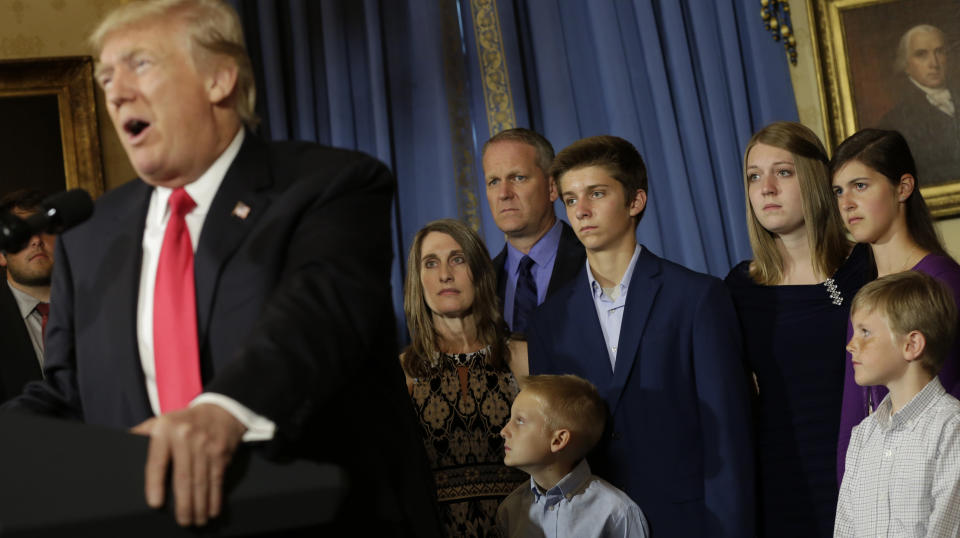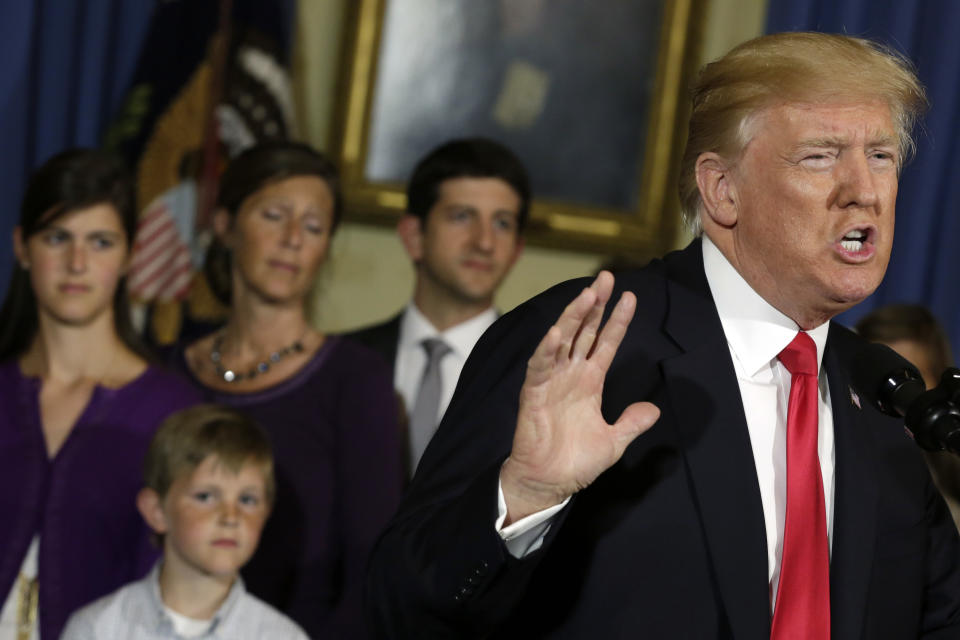Trump’s Zig-Zagging On Health Care Back To Zig. For Now.
WASHINGTON – If you don’t like what President Donald Trump said about the Republican health care plan Monday afternoon, don’t worry about it.
If recent months are any guide, he’ll have a new take on it soon. Probably really soon. Like maybe even tomorrow.
From the very start of his administration, Trump has veered between demanding that his predecessor’s health care law be repealed at once to claiming near indifference, that he would simply let the Affordable Care Act fail on its own.
“He has no understanding of the issue of health care,” said Rice University presidential historian Douglas Brinkley, adding that Trump is merely trying to position himself so he can blame Senate Republicans if the repeal does not happen. “Whatever he’s doing is just show-biz.”
On Monday, Trump’s stage was the White House. He gathered together several families who he said had been hurt by former President Barack Obama’s signature legislative achievement, and then read a short speech urging GOP lawmakers to act.
“Any senator who votes against starting debate is telling America that you are fine with the Obamacare nightmare, which is what it is,” Trump said, once again on the “act now” tack. “For Senate Republicans, this is their chance to keep their promise. Over and over again, they said repeal and replace, repeal and replace.”
Yet that comes only six days after Trump said with seeming petulance that Democrats were to blame for the legislation’s failure to move in the Senate. “We’re probably in that position where we’ll let Obamacare fail,” he said. “We’re not going to own it. I’m not going to own it. I can tell you the Republicans are not going to own it. We’ll let Obamacare fail and then the Democrats are going to come to us.”
The mixed messages now are a replay of his inconstant approach as House Speaker Paul Ryan worked to get a version of the bill through his chamber in the spring. For weeks, Trump exuded confidence, only to agree to Ryan’s March 24 recommendation to yank the bill from the floor when it became clear he lacked the votes to pass it.
Trump reacted with bitterness then, too. “This is not a Republican health care, this is not anything but a Democrat health care. And they have Obamacare for a little while longer, until it ceases to exist, which it will at some point in the near future. And just remember this is not our bill, this is their bill,” he said that afternoon, adding that he was moving on to tax reform, which he said he wanted to do first all along.
When Ryan modified the House bill enough to assuage some of his most conservative members to support it and was able to squeak it through on a 217-213 vote in early May, Trump was so triumphant that he invited all Republican House members to the White House Rose Garden for a celebration typically reserved for bill signings.
Yet five weeks later, Trump was criticizing that exact bill as “too mean” in a closed-door meeting with Republican senators and urged them to write a version with more money and which was more “generous” and “had heart.”
Trump’s scattershot approach to passing the GOP health care legislation might have been foreseen in his varying views on health care generally during the campaign.
Trump promised both a guarantee of health care for everyone as well as lower health insurance premiums, more choice in doctors and reduced out-of-pocket costs. “You’re going to have such great health care at a tiny fraction of the cost, and it’s going to be so easy,” he said last October.
What’s more, Trump promised this combination of mutually exclusive features in record time. “We will do it, and we will do it quickly,” he said in November.
Conservative writer Ramesh Ponnuru, a senior editor at National Review and a visiting fellow at the American Enterprise Institute, said Trump’s difficulties today stem from his failure to study the issue last year the way primary opponents like Jeb Bush or John Kasich had.
“He can’t, for example, make the case for the bill, or horse-trade its provisions in calls with senators,” Ponnuru said. “President Obama could have done that, and Bush and Kasich could have done that too.”
Love HuffPost? Become a founding member of HuffPost Plus today.
This article originally appeared on HuffPost.

